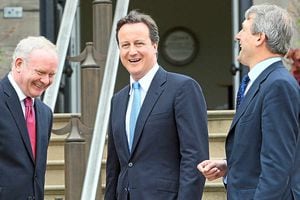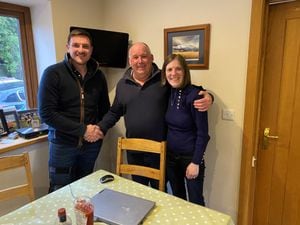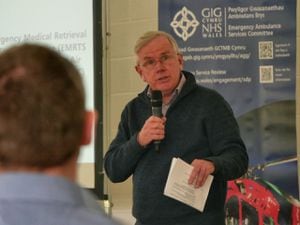Martin McGuinness death: IRA victims should not be forgotten amid tributes, says Shropshire MP Owen Paterson
The victims of IRA terror should not be forgotten amid tributes to the former Deputy First Minister of Northern Ireland Martin McGuinness, a Shropshire MP has said.

Ex-IRA commander and Sinn Fein veteran Mr McGuinness died overnight aged 66 after a short illness.
He was diagnosed with a rare heart condition at the end of last year and died in hospital in his hometown of Londonderry surrounded by family members.
Owen Paterson, who was Secretary of State for Northern Ireland, said Mr McGuinness's lifelong aim had been for a united Ireland.
He said that the two had had a cordial and constructive relationship. But Mr Paterson said he could not condone Mr McGuinness's early years.
The Deputy First Minister's last major act as a politician was to pull down the powersharing executive at Stormont when he resigned in protest at the Democratic Unionists' handling of a green energy scandal.
He announced his retirement from frontline politics ten days later.
His journey from gunman to statesman saw him shake hands with the Queen and forge an unlikely friendship with Unionist Ian Paisley.
Speaking from his office in Westminster, Mr Paterson said his relationship with Mr McGuiness had been cordial.
"I served as Shadow Secretary of State for Northern Ireland from 2007 to 2010 and as Secretary of State from 2010 to 2012," he said.
"During that time, Martin McGuinness was Deputy First Minister of Northern Ireland, pursuing his lifelong political aim of a united Ireland by peaceful, democratic means.
"Although we did not agree on the future of Northern Ireland, we built up a perfectly cordial and constructive relationship."
As tributes were made to Mr McGuinness, Mr Paterson said victims of IRA terror should not be forgotten.
"I cannot condone his earlier years, in which he pursued his political ambitions through a shockingly violent terrorist campaign," he said.
This caused death, destruction and ruined many lives. Whilst his later renunciation of violence was undoubtedly vital in fostering peace among the wider republican movement, we should not forget the many victims of terror who were not given such a choice."
In 2012 when The Queen shook hands with Mr McGuinness Mr Paterson said it was the right thing to have happened.
Speaking at the time he said noone should underestimate the pain felt by the royal family at the murder of Lord Mountbatten.
"The Queen should meet all elected public officials during her Jubilee tour and doesn't have to agree with the political views of everyone she meets," he said.
Former Montgomeryshire MP Lembit Opik was the Liberal Democrat's shadow Northern Ireland secretary from 1998-2008 and says he knew Mr McGuinness very well.
"I worked with him very closely during the Northern Ireland peace process and found him intelligent and utterly principled," he said.
"He was a leader in his community and you could trust what he said. What he said was always well informed and meaningful."
Mr Opik who grew up in Bangor, County Down - where his parents had fled from Soviet occupied Estonia - said he had not been surprised by the friendship that grew between Mr McGuinness and Unionist lader, Ian Paisley in their later lives.
"They both had so much in common. They both had deep held values, both loved their communities and both were passionate about their beliefs," he said.
Mr McGuinness had, as much as he could given his history, turned his back against violence, Mr Opik said.
"In doing so he took a great, personal risk. There were still dissidents that did not like the path the peace process was taking - he was a brave man."
"When people are so passionate about their beliefs and feel that they are being oppressed they sometimes feel they have no alternative but to resort to any means possible to make a change."
Mr Opik said he agreed with the former First Minister and Nobel Peace Prizewinner, David Trimble who said on signing the Good Friday Agreement of 1998, "Just because you have a past doesn't mean you can't have a future."
"I myself was involved in the Independence First For Estonia Movement. When people are oppressed in their own country there will be people who feel they have to resort to all means possible to make change," he said.
Mr McGuinness, who lived in the Bogside area of Derry his whole life, is survived by his wife Bernie and four children.
Sinn Fein president Gerry Adams paid tribute to his lifelong friend.
"Throughout his life Martin showed great determination, dignity and humility and it was no different during his short illness," he said.
"He was a passionate republican who worked tirelessly for peace and reconciliation and for the reunification of his country.
"But above all he loved his family and the people of Derry and he was immensely proud of both."
Prime Minister Theresa May said Mr McGuinness "played a defining role" in leading the Republican movement away from violence.
"First and foremost, my thoughts are with the family of Martin McGuinness at this sad time," she said.
"While I can never condone the path he took in the earlier part of his life, Martin McGuinness ultimately played a defining role in leading the republican movement away from violence.
"In doing so, he made an essential and historic contribution to the extraordinary journey of Northern Ireland from conflict to peace."
Mr Paisley's son Kyle tweeted: "Very sorry to hear about the passing of Martin McGuinness.
"Look back with pleasure on the remarkable year he and my father spent in office together and the great good they did together. Will never forget his ongoing care for my father in his ill health."
President of Ireland Michael D Higgins led tributes from the Irish Republic, saying Mr McGuinness's death left a gap that would be hard to fill.





